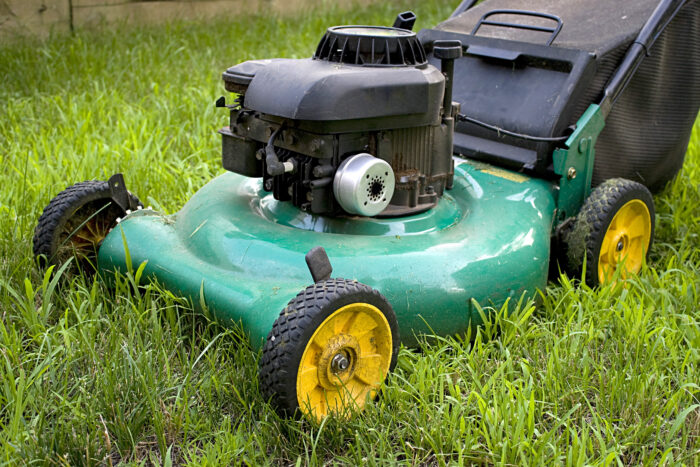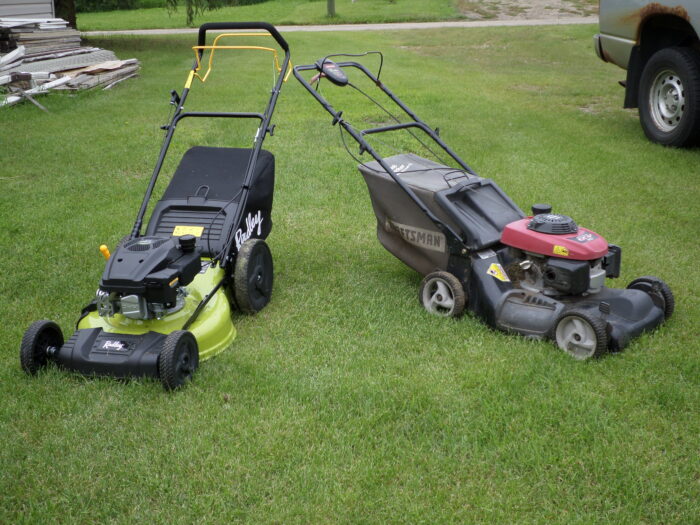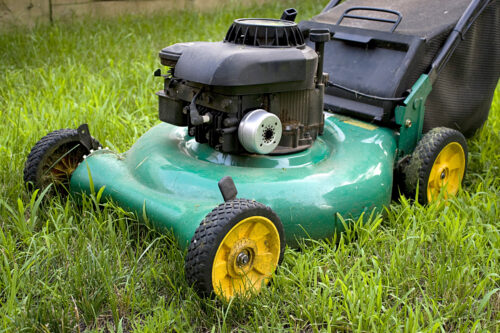Push gas lawnmowers produce around 85 decibels of noise. At that sound level, hearing damage can begin in 2 hours. Riding gas mowers come in at over 100 decibels, while push electric mowers are around 75 decibels–still not real quiet but not dangerous.
Lawnmowers are difficult to soundproof because of their power, speed, and configuration. But it is certainly worth trying. The 3 decibel rule states that for every 3 decibel reduction, there is a 50% reduction in noise.
Here are some ideas that will get you that 3 decibel reduction–and then some.
 Gas powered push lawn mower cutting through the grass.
Gas powered push lawn mower cutting through the grass.
6 Ways to Make a Lawnmower Quieter
Any one of these suggestions may be enough to make your lawnmower as quiet as you want it. But they are not mutually exclusive. Using more than one idea can only make things better.
1) Lawnmower Maintenance
A well-maintained lawnmower will run better, last longer, cut better, and run quieter. All engine parts rely on each other to run well. For instance, contaminated fuel could gum up the exhaust making it louder. Your owner’s manual will have a maintenance schedule. It should also provide information you need–like the weight of oil, and spark plug type and gap.
- Change Oil. Most lawnmower manuals recommend changing oil every 25 – 50 hours of operation. 50 hours is 2 hours of mowing per week for 25 weeks. I find that having an oil and maintenance day early in spring when I do all small motor oil changes and maintenance is generally sufficient for the year. Make sure to clean and/or replace your air filter at the same time. Dirty plugged air filters will make the lawnmower work harder and produce more noise.
- Keep it Clean. Cutting wet grass and/or running over dirt can have stuff sticking to the bottom of the deck, which impedes the mower from bagging or discharging cut grass. If the build-up gets thick enough the mower will start vibrating and making loud unhappy noises. Clean it out right away before you damage the mower. To minimize this problem, wire brush the underside of the mower deck clean and spay it with dry silicone lubricant.
- Sharpen the Blade. It goes without saying that a sharp blade cuts better. It also makes less noise because it cuts cleanly. I usually sharpen ours 2 or 3 times a year because of rocks, branches, and pine cones. Make sure you sharpen the blade evenly. An unbalanced blade will make the machine vibrate more and make more noise. It can also damage the motor.
- Keep Things Tight. When you are changing oil, give the mower a quick once-over–checking that screws and bolts, and cables are all secure. Not only will loose things shorten the lawnmower’s life, they can damage the mower, and maybe even be dangerous. Picture a sharp blade coming out from under the deck at speed. Having experienced that, I can assure you that it raises the heart rate a bit.
- Check the Spark Plug. Remove the spark plug yearly (oil change time?) to check it for a build-up of carbon. Use a wire brush to clean it off and check the gap with a gapping tool. (Your owners manual should have the correct gap size,.) Change the spark plug if you can’t get it clean or gapped properly. A filthy plug may be a sign of contaminated fuel or worn piston rings.
2) Replace the Muffler
The exhaust/muffler is the noisiest part of your lawnmower. Unlike your vehicle–which has an exhaust manifold, feet of pipe, a catalytic converter, and more pipe–your lawnmower has a very short length of pipe between the cylinder and muffler. The muffler is your lawnmower’s main noise abatement device. It also prevents sparks from escaping the motor and helps maintain engine pressure.
Check your muffler for external damage such as holes, rust, corrosion, and cracks. Remove the muffler from a cold motor, and give it a shake. No noise and no external damage means you can put it back on. Check the gasket for damage. Even if it looks Ok, I would put a little liquid gasket on it. Even a small hole will increase mower noise significantly.
Yes, you can clean your muffler, but when you take it off and shake it, and it sounds like a tin of dry rice–why bother? Buy a new muffler and gasket. You should be able to buy from the original manufacturer. Or if it is an old machine, it may be worth looking for an upgraded quieter muffler.
3) Soundproof the Mower Deck
The top and exterior of the deck–not underneath. Generally it is always a better idea to soundproof inside the area producing the noise. In the case of your lawnmower, it is just easier to deal with the outside of the deck and stay away from the area where wet grass and other objects are thrashing around at speed.
Use a product like Noico 80 automotive soundproofing. This 1/8″ thick self-adhesive sound deadener is used all over vehicles–from stopping speaker rattle to eliminating road noise.
To install Noico 80, wash all of the dirt and grime off the deck. Then use a 50/50 vinegar and water solution to remove any oxidation. Rinse and dry well. Cut strips to cover the sides and then stick it on the top of the deck and fold it over the sides for a complete job. Buy a roller to roll the product smooth for tight adhesion. Noico is available in a shiny aluminum finish or in black aluminum.
Note: Noico is used in auto wheel wells to deaden road noise. So you could try it on the underside of the lawnmower deck, Wire brush it clean and wash it well before installation. The big difference is that if it comes off your wheel well, it falls on the road. If it comes loose under the lawnmower deck, it makes ugly noises as the blade beats it to death.
For more information on automotive soundproofing please see our articles Kilmat vs Noico vs Dynamat vs Hushmat and How to Fix Car Speaker Rattle.
4) Add a Silencer to the Exhaust System
A silencer is really just another name for a muffler–a better and more efficient muffler that will make your lawnmower quieter. Most of them require you to remove the existing muffler and pipe. They then screw directly into the exhaust outlet and replace the entire muffler assembly.
You may also be able to attach another small inline muffler between the motor and the existing muffler. This will make the machine quieter. It is possible to accomplish better noise reduction just by adding a longer piece of pipe between the motor and muffler, Get one with a curve in it. The curve will also make the exhaust quieter.
Note: Be careful that your silencer, extra muffler, or longer pipe do not create too much back pressure.
5) Wear Hearing Protection
If none of these ideas get your lawnmower quiet enough, you can start wearing ear protection. Although there are many types of ear protection available, the two most commonly used are foam ear plugs and commercial-type over the head earmuffs. You can get more information on different types of earmuffs from our article The Best Noise Cancelling Earmuffs for Sleeping. (Although the article is aimed at earmuffs for sleeping, there are some ideas you might find attractive for your situation.)
Note: Everyone should be wearing ear protection when noise levels start getting close to 80 decibels. Two hours at 85 decibels can cause permanent hearing damage. And I am willing to bet that not all ears are created equally. Some hearing will probably be damaged at lower sound levels.
Foam Earplugs
Single-use foam ear plugs are very inexpensive–starting at under $10.00 for 50 pairs. The better ones will reduce the noise entering your ears by over 32 decibels. This significant decrease can bring the noise level down to around 50 decibels- the sound of your refrigerator. Roll them into a small compressed tube before inserting them into your ear canals. They will expand to fill the available space and block noise.
Some people find ear plugs too annoying to wear. Or they find themselves allergic to the foam. Move on to other options.
Over the Head Earmuffs
Over the head earmuffs are reusable. You can get many years use out of a good pair. You can buy them for as little as $15.00, with the better products costing over $50.00. There are multiple types of cushions and padding. They are available with speakers for music, Bluetooth, or with radios in the muff.
The less expensive options will reduce noise by around 24 decibels–making your lawnmower about as loud as normal conversation. More expensive earmuffs will reduce the noise level by well over 30 decibels–bringing the noise level down to the sound of your refrigerator.
6a) Buy a New Quiet Lawnmower
 The Old and the New Lawnmowers
The Old and the New Lawnmowers
I think it is fairly rare for anyone to buy a new lawnmower simply because of noise. But if anyone is going to get rid of a mower because of noise, it will be a 2-stroke motor. These things make way more noise than a 4-stroke motor. I think most people would try some of the sound reducing ideas here, then put up with the noise until the wheels start falling off.
But when the wheels do start falling off, look for the quietest lawnmower you can afford. Here is a little information about some of the most popular models.
- Gas Powered Push Mower. About 80 decibels when new. Most popular type of mower.
- Gas Powered Riding Mower. Up to 102 decibels. Can permanently damage hearing in minutes.
- Battery Powered Push Mower. Around 56 decibels when new. May have limited run time.
- Electric Riding Mower. About 75 decibels when new. Cord can be annoying.
- Manual Push Reel Mower. About 55 decibels when new. Not including operator’s cussing.
For much more details on quiet lawnmowers, please see our article The Best and Quietest Lawnmower.
6b) Buy a Robotic Lawnmower
These lawnmowers deserve their own separate category because they may be the long term solution to most mowing issues. They are the outdoor equivalent to indoor robotic vacuum cleaners–working independently without you interacting with it. After the initial setup.
Although I admit to absolutely zero experience with these lawnmowers, some research and review reading has me considering getting one. Some of the benefits I see include:
- Very quiet lawnmower at under 60 decibels–the sound of normal conversation
- Self contained and self charging
- Works in the rain
- Some machines will take care of up to 2 acres
- You do not have to drive it or push it
A few concerns I have:
- Cutting on slopes
- Uneven terrain
- Kids and pets
- Long grass
When you are in the market for a new quiet mower, you should at least consider one of these. They are quite expensive, but if you factor in the time you will save pushing a mower around, it might be worthwhile.
Additional Noise Reducing Suggestions
Although most lawnmower noise is produced by the motor, exhaust, and blade while cutting, there are a few other things you can do to quieten your lawnmower.
- Lubrication. Lawnmower wheels are usually plastic hubs–with or without a bushing–on a spindle with a nut holding them on. Spray them once or twice a year with dry silicone lubricant to eliminate squeaking. Spray all of your throttle and drive cables. Spray any springs and hinges. Anything that moves to eliminate noise.
- Blade Adjustment. Setting your blade, or lawnmower to cut higher will reduce the noise coming from under the mower deck. You are cutting less grass and softer grass, which makes less noise. On the other hand, leaving the grass longer means you will be cutting it more often. Personally, I prefer to cut grass low and slow, and fewer times per year. (I set it just high enough so the worms do not have to duck as I am going over.)
- Fuel Quality. You should never leave fuel in the machine over winter. It degrades and makes the lawnmower run rough and loud when first used each spring. If you don’t want to dump the remaining gas on the nearest ant hill every autumn, at least run it close to empty. Then when you fill it first time each cutting season, you should have diluted it enough to allow it to run smoothly and quietly.
- Clogged or Dirty Fuel Line. One long term result of dirty or degraded fuel is restricted fuel flow to the motor. This starves the motor– potentially causing backfiring and more noise. Fuel lines are usually fairly short and made of rubber. They are easy to change and well worth the effort. When you have the air filter off, clean the carburetor out with alcohol and a Q-tip.
Summary
Lawnmowers take a lot of grief because of the noise they produce. But having a lawn means that you usually have to cut it. Which will mean a lawnmower of some description. (Most jurisdictions discourage herds of sheep.)
As mentioned, gas lawnmowers are difficult to make quieter. There are only a few areas that can be affected by soundproofing measures. And they only seem to be partially effective. But you can maybe take heart from The 3 Decibel Rule which states that for every 3 decibel increase or decrease in noise level, there is a 50% increase or decrease in sound pressure.
All of which means that if you can get a 2 decibel noise reduction from the muffler, a half decibel from a tune-up (oil change, spark plug, etc.), and another half decibel from a sharper blade and some deck soundproofing, your perceived noise level will decrease by 50%. That will not only make the operator happier, but also your family and neighbors.
FAQs
A few common questions about lawnmowers.
1) Can I use a lawnmower without a muffler?
Yes. But only if you enjoy confrontations with your family, the neighbors, and the bylaw enforcement officers. Lawnmowers are plenty loud without operating it without a muffler.
2) Are electric mowers as loud as gas mowers?
No. On average corded electric mowers are about 10 decibels quieter than gas powered mowers–75 decibels compared to 85 decibels. Battery powered mowers could be as much as another 10 decibels quieter. What you will lose for the additional quietness is power and versatility. And in the case of battery powered–cutting time.
3) I understand that European lawnmowers are quieter than North American models. Is that true?
Yes. European noise laws are stricter than those in North America. European type lawnmowers are a little hard to get here, But if you approached a company that manufactures in Europe–like Husqvarna–you could probably order one. Be prepared to pay a little extra.

